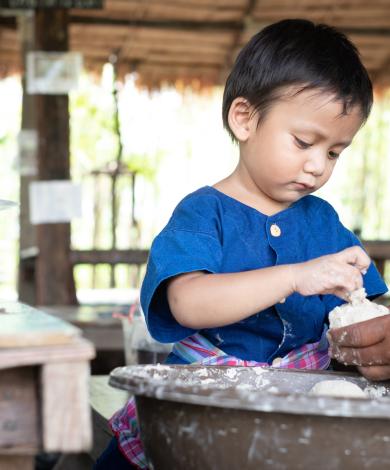Background
During 2009, UNHCR commenced the implementation of a strategy to achieve a reduction in anaemia and other micronutrient deficiencies/malnutrition, thereby enhancing growth, development, and health in refugee populations across their global operations. Project activities were initiated in seven countries during 2008 and 2009, and expanded during 2010/11.
Between 2010 and 2013, the ENN in partnership with the UCL Institute for Global Health (IGH) provided a package of technical assistance to UNHCR, in support of the High Commissioner’s Special Project on the prevention, control and reduction of anaemia in refugees.
Project Summary
The ENN/IGH team provided technical support and analytical services for the assessment of anaemia and micronutrient malnutrition and the implementation of nutritional services.
In 2009 UNHCR and WFP published joint guidance on selective feeding programmes for the management of acute malnutrition. In 2011, the UNHCR Operational Guidance on the use of Special Nutritional Products was developed to provide additional detailed guidance on the implementation of Blanket Supplementary Feeding Programmes (BSFP). The 2011 Operational Guidance describes the expanded scope of BSFP in refugee operations to prevent micronutrient deficiencies, stunting and acute malnutrition, and focuses on the use of lipid based nutrient supplements (LNS) and micronutrient powders (MNP). An addendum with updated content was developed in 2013 by IGH with technical support from the ENN.
Also in an ENN/IGH collaboration, standardised nutrition survey guidelines for refugee settings (SENS guidelines) were developed. See below for the survey guidelines module on anaemia developed by IGH and ENN. These were field tested by the team in Kakuma and Dadaab camps, Kenya, in 2013.
During 2013, ENN also developed with UNHCR Standardised Operating Procedures on handling breastmilk substiutes in refugee settings.
Key resources
- UNHCR Operational Guidance on the Use of Special Nutritional Products to Reduce Micronutrient Deficiencies and Malnutrition in Refugee Populations (2011)
- The emerging challenge of the double burden of malnutrition in protracted emergencies: A cross-sectional study of under-nutrition and obesity among Western Sahara refugees (2012)
- Assessment of the effectiveness of a small quantity lipid-based nutrient supplement on reducing anaemia and stunting in refugee populations in the Horn of Africa: Secondary data analysis (2017)


